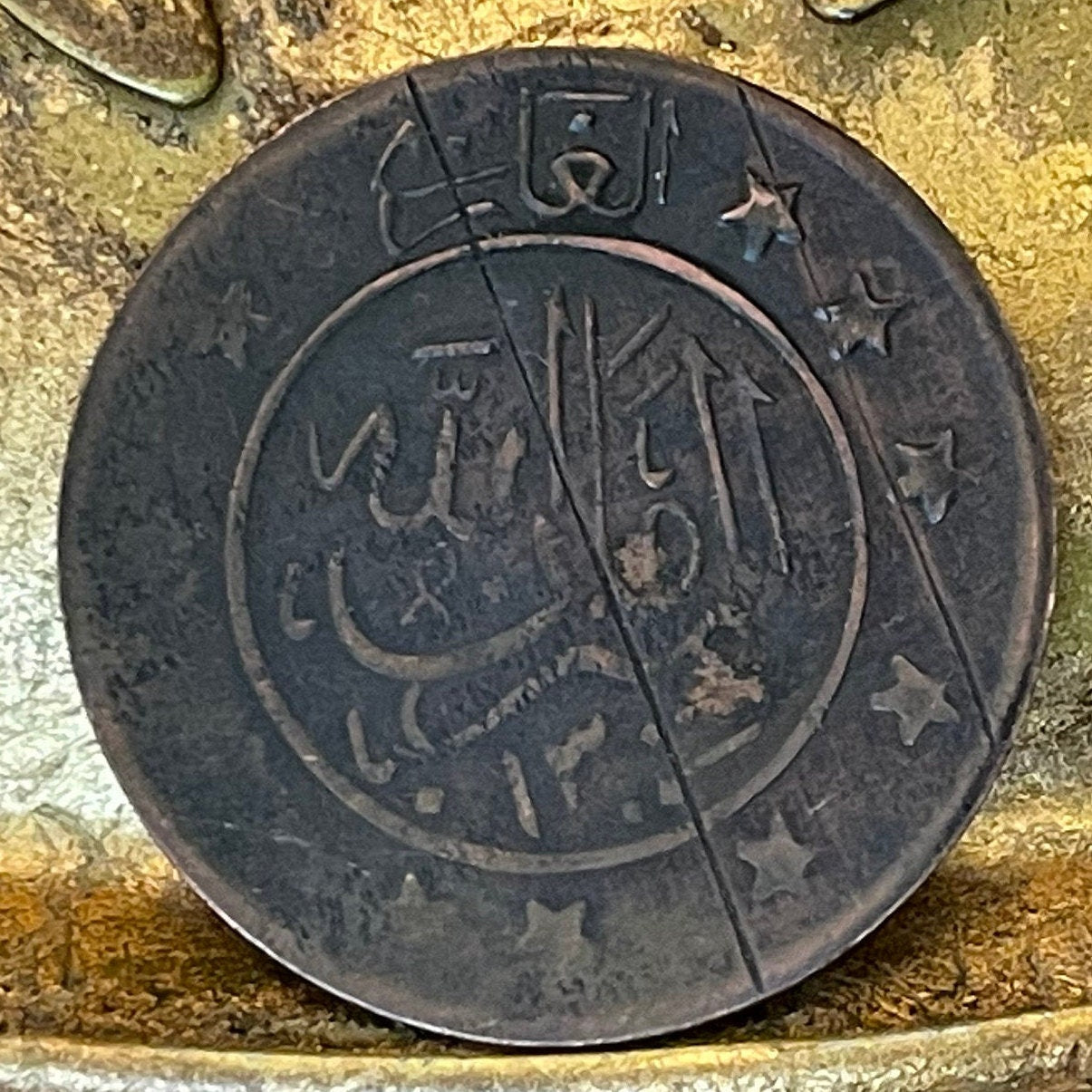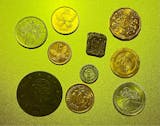elemintalshop
Afghan Mosque with Stars 1919 Great Game Ghazi Amanullah Khan 3 Shahi Afghanistan Authentic Coin Money for Jewelry (CONDITION: Fair)
Afghan Mosque with Stars 1919 Great Game Ghazi Amanullah Khan 3 Shahi Afghanistan Authentic Coin Money for Jewelry (CONDITION: Fair)
Couldn't load pickup availability
Mosque with Stars & Great Game Ghazi Amanullah Khan 3 Shahi Afghanistan Authentic Coin Money for Jewelry and Craft Making (1919) CONDITION: Fair
Reverse: Value (3 Shahi in Suls) at top. Mosque within a circular 7-rays sunburst at the center. All surrounded by 10 stars. Crossed sabres (hilts up) below mosque.
Source: A Catalog of Modern Coins of Afghanistan:
https://issuu.com/persic/docs/series-iii_amanullah_khan-ver-2/22
Obverse: "Amir Amanullah" and at top, "al-ghazi : الغازی" (i.e. "Conqueror/Victorious")
Date and legend with a circle surrounded by 10 stars. (Date over Shamsi script.)
Features
Issuer Afghanistan
Emir Amanullah (1919-1926)
Type Standard circulation coin
Year 1298 (1919)
Calendar Iranian - persian
Value 3 Shahi = 1/4 Rupee (0.25)
Currency Rupee (1747-1925)
Composition Copper
Weight 9 g
Diameter 32.06 mm
Shape Round
Orientation Medal alignment ↑↑
Demonetized Yes
Number N# 75952
References KM# 871.2
Wikipedia:
Ghazi Amanullah Khan (Pashto: غازي امان الله خان, Dari: غازی امان الله خان) was the sovereign of the Kingdom of Afghanistan from 1919 to 1929, first as Emir and after 1926 as King.[1] After the August 1919 end of the Third Anglo-Afghan War, Afghanistan was able to relinquish its protected state status to proclaim independence and pursue an independent foreign policy free from the influence of the United Kingdom.
His rule was marked by dramatic political and social change, attempting to modernize Afghanistan on Western designs, which he did not fully succeed in, due to an uprising by Habibullah Kalakani and his followers. On 14 January 1929, Amanullah abdicated and fled to neighbouring British India as the Afghan Civil War began to escalate. From British India he went to Europe where after 30 years in exile, he died in Italy, in 1960 (yet apparently and reportedly according to the Encyclopaedia Britannica: Amānullāh Khan would have died in Zürich in Switzerland). His body was brought to Afghanistan and buried in Jalalabad.
**********
Amanullah Khan was fiercely anti-British and wanted to destroy an old agreement which gave the British control over Afghanistan's foreign policy. The British resisted this move, and so began the Third Anglo-Afghan War (1919). After a brief struggle, the British were forced to negotiate and in the end surrendered their control over Afghanistan's foreign policy.
Afterwards, Amanullah became a national hero, and was given the title Ghazi
Source: http://www.worldofcoins.eu/forum/index.php?topic=37709.0
********
Wikipedia:
The Third Anglo-Afghan War (Persian: جنگ سوم افغان-انگلیس; Pashto: د افغان-انگرېز درېمه جگړه), also known as the Third Afghan War, the British-Afghan War of 1919 and in Afghanistan as the War of Independence, began on 6 May 1919 when the Emirate of Afghanistan invaded British India and ended with an armistice on 8 August 1919. The war resulted in the Afghans winning back control of foreign affairs from Britain, and the British recognising Afghanistan as an independent nation. According to British author Michael Barthorp, it was also a strategic victory for the British because the Durand Line was reaffirmed as the border between Afghanistan and the British Raj, and the Afghans agreed not to foment trouble on the British side. However, Afghans who were on the British side of the border did cause concerns due to revolts.
**********
Wikipedia:
A ghazi (Arabic: غازي, Arabic pronunciation: [ɣaːziː], plural ġuzāt) was an individual who participated in ghazw (غزو, ġazw), meaning military expeditions or raiding. The latter term was applied in early Islamic literature to expeditions led by the Islamic prophet Muhammad, and later taken up by Turkic military leaders to describe their wars of conquest.
In the context of the wars between Russia and the Muslim peoples of the Caucasus, starting as early as the late 18th century's Sheikh Mansur's resistance to Russian expansion, the word usually appears in the form gazavat (газават).
In English-language literature, the ghazw often appears as razzia, a borrowing through French from Maghrebi Arabic. In modern Turkish, it is used to refer to veterans, and also as a title for Turkic champions such as Ertuğrul, Osman I, and Mustafa Kemal Atatürk.
Use in the modern era
In the 19th century, Muslim fighters in North Caucasus who were resisting the Russian military operations declared a gazawat (understood as holy war) against the Russian Orthodox invasion. Although uncertain, it is believed that Dagestani Islamic scholar Muhammad Yaragskii was the ideologist of this holy war. In 1825, a congress of ulema in the village of Yarag declared gazawat against the Russians. Its first leader was Ghazi Muhammad; after his death, Imam Shamil would eventually continue it.
Share










love the coin. happy with my purchase.
Nice finding an older coin.
Thank you very very very much
Great coin. . . .










